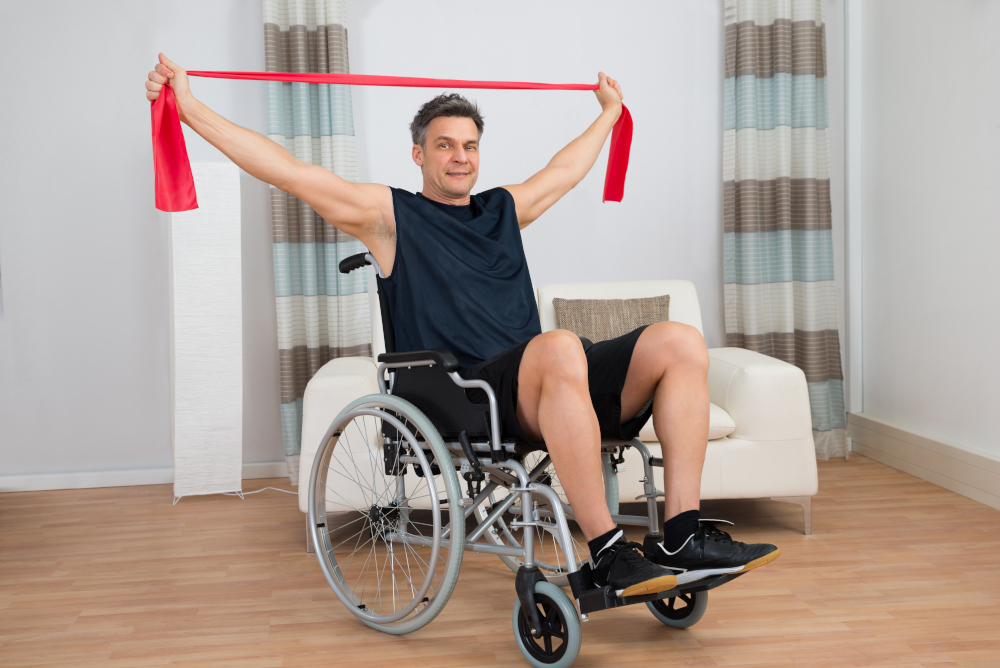
Mobility aids like wheelchairs, walkers, canes, and scooters are indispensable tools for individuals with mobility limitations. They empower people to navigate daily life with independence and freedom.
However, it’s crucial to focus on maintaining your health while using mobility aids to ensure an excellent quality of life. In this comprehensive guide, we’ll delve into each key strategy to help you stay healthy and active while relying on mobility aids.
Stay Active
Physical activity is the cornerstone of overall health, and it remains entirely possible with mobility aids. Here’s how to ensure you stay active:
- a. Consult with a Physical Therapist: Begin by consulting a physical therapist who can design an exercise routine tailored to your specific needs. They will take into account your mobility aid and any physical limitations.
- b. Chair Exercises: Explore chair exercises that can help maintain muscle strength and flexibility. These exercises can be adapted to various mobility aids and can be performed while seated.
- c. Resistance Bands: Resistance bands are a versatile tool for strength training. They are portable, lightweight, and can be used to target various muscle groups, helping you maintain your strength.
- d. Upper Body Workouts: Focus on upper body workouts to enhance your upper body strength, which is essential for mobility aid users. This can involve exercises like lifting weights or resistance bands.
Pay Attention to Your Posture
Proper posture is vital when using mobility aids to prevent muscle strain, pain, and discomfort. Here’s how to maintain good posture:
- a. Proper Sizing and Adjustment: Ensure your mobility aid is appropriately sized and adjusted to fit you comfortably. This includes the height of your wheelchair or the handlebar height of your walker.
- b. Body Mechanics: Learn and practice proper body mechanics when using your mobility aid. For example, use your legs and core muscles when transferring in and out of a wheelchair, and maintain an upright posture while walking with a walker or cane.
Maintain a Balanced Diet
A well-balanced diet is fundamental for maintaining overall health, even for those using mobility aids. Consider the following dietary guidelines:
- a. Nutrient-rich foods: Emphasize a diet rich in fruits, vegetables, lean proteins, and whole grains. These foods provide essential nutrients and support your immune system.
- b. Consult a Dietitian: Consult a registered dietitian to create a personalised nutrition plan that addresses your specific dietary needs, especially if you have underlying medical conditions.
Manage Your Medications
Effectively managing your medications is essential for your health. Here’s how to ensure you stay on top of your medication regimen:
- a. Medication Schedule: Maintain a detailed medication schedule that includes the names of your medications, doses, and the times you need to take them. You can use medication reminder apps or alarms to help you remember.
- b. Medication List: Keep an up-to-date list of your medications and any allergies. Carry this list with you at all times, and share it with healthcare providers during appointments or emergencies.
Prioritise Mobility Aid Maintenance
Your mobility aid is a valuable lifeline, and proper maintenance is essential. Follow these steps to ensure your equipment functions safely and efficiently:
- a. Regular Inspections: Conduct regular inspections of your mobility aid to check for wear and tear, loose parts, or any signs of malfunction.
- b. Cleaning and Lubrication: Clean and lubricate moving parts as recommended by the manufacturer. This simple maintenance can significantly extend the lifespan of your mobility aid.
Stay Hydrated
Proper hydration is crucial for overall health. Water plays a pivotal role in various bodily functions, including digestion, circulation, and temperature regulation. Here’s how to stay adequately hydrated:
- a. Water Accessibility: Keep a water bottle within reach, ensuring it’s easily accessible regardless of your mobility aid. Sip water throughout the day to maintain hydration.
Regular Medical Checkups
Even with mobility aids, regular medical checkups are essential to monitor your overall health and address specific concerns:
- a. Routine Appointments: Schedule regular appointments with your healthcare provider. These checkups allow them to monitor your overall health, manage chronic conditions, and make necessary adjustments to your treatment plan.
Seek Support and Socialise
Social support and a sense of belonging are critical for mental and emotional well-being. Here’s how to stay connected and engaged:
- a. Maintain Relationships: Stay connected with friends and family, as social interactions can significantly boost your mental health and emotional well-being.
- b. Join Support Groups: Consider joining support groups or communities for individuals with mobility challenges. Sharing experiences and receiving emotional support can provide a sense of belonging and empowerment.
Adapt Your Environment
Adapting your living space to be more accessible and safe is essential for your well-being. Consider these steps:
- a. Remove Tripping Hazards: Identify and remove tripping hazards in your home, such as loose rugs, clutter, or electrical cords.
- b. Install Grab Bars: Install grab bars in key areas, like the bathroom, to assist with mobility and prevent falls.
- c. Adequate Lighting: Ensure proper lighting throughout your home to enhance visibility and reduce the risk of accidents.
Conclusion
Using mobility aids doesn’t mean sacrificing your health and well-being. By following these comprehensive strategies, you can continue to lead a healthy, fulfilling life while relying on mobility aids. Remember that your health is invaluable, and with the right approach, you can preserve and enhance it, regardless of your mobility challenges.